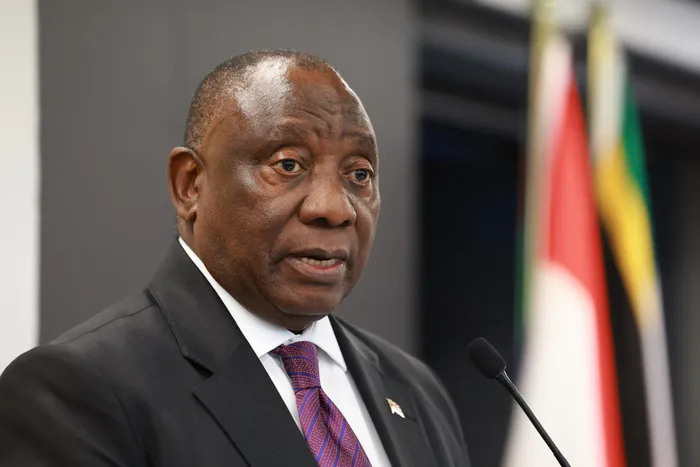Ramaphosa accuses DA of “cheaply” exploiting engagements between SA and US

The Presidency has accused the DA of being part of a right-wing nexus that seeks to use a foreign state to effect changes to democratically developed national policies in South Africa.
Image: GCIS
IN YET another sign of deep divisions between Government of National Unity (GNU) partners, the ANC and DA, the Presidency has accused the DA of being part of a right-wing nexus that seeks to use a foreign state to effect changes to democratically developed national policies in South Africa.
This was in response to a statement DA international relations spokesperson Emma Powell issued on Tuesday claiming that President Cyril Ramaphosa had been fully aware that his “Special Envoy” to the US Mcebisi Jonas was not welcome in Washington D.C.
She also claimed the US government had rejected Jonas’s credentials and informed the Presidency that he would not be recognised as South Africa’s official interlocutor.
“The Ramaphosa administration was explicitly advised on multiple occasions that Jonas was not acceptable to Washington and was urged to appoint an alternative envoy. Despite these clear and repeated communications, the Presidency continued to mislead the public by insisting that Jonas remained the President’s special envoy to North America, responsible for leading the charge in repairing bilateral relations between our two countries.”
Powell said the Presidency owed South Africans an explanation as to how it can justify having doubled down on the appointment of a rapporteur whose credentials have been officially rejected by the host government.
“The DA will take all necessary steps to demand the immediate appointment of a credible envoy, capable of repairing the immense damage that has now been done,” she said.
In a statement Tuesday night, the Presidency accused the DA of spreading disinformation on matters of international relations and diplomacy as official government policy.
The DA’s latest effort to embarrass President Cyril Ramaphosa’s Special Envoy to North America, Mr Jonas Mcebisi, involves claims - in the DA’s framing – that the United States has rejected Mr Jonas’s “credentials” and that Mr Jonas is therefore unable to perform his role as Special Envoy.
“The DA seeks to add sensationalism to its claim by suggesting President Ramaphosa and Mr Jonas face a crisis in view of the United States’ pending implementation of trade tariffs announced several days ago by President Donald Trump. The facts around this matter include the reality that Special Envoys do not present diplomatic credentials to host countries in the way designated Heads of Mission or other diplomats are.”
Jonas’s outreach does not in any way supersede the leading role played by the Department of Trade, Industry and Competition (DTIC) and the Department of International Relations and Cooperation (DIRCO) in trade negotiations with the US, or in diplomatic relations with this longstanding partner.
“The Presidency is therefore concerned about the Democratic Alliance’s persistent campaign against South Africa’s national interest and its posture of trying to embarrass and belittle our country and in this specific circumstance, Mr Jonas. This campaign has its origins in a Democratic Alliance visit to the United States earlier this year, to advance an ideological agenda rather than our national interest.”
The Presidency said the DA was trying “cheaply but dangerously” to exploit a critical engagement between South Africa and the US to protest Ramaphosa’s removal of Andrew Whitfield as Deputy Minister of Trade, Industry and Competition.
“The DA’s pronouncements and insults against countries and international organisations – such as the Republic of Cuba or the United Nations Relief and Works Agency for Palestine Refugees – offends South Africa’s international relations and posture.
“If the DA were to succeed in undermining South Africa relations with various nations or institutions, the party would harm the viability of businesses and livelihoods of hundreds of thousands of South Africans who work in sectors that depend on the expansion of our trade relations with the world.”
Cape Times